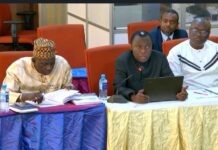As police deepen probes in the Gampetrolum scandal, the Gambia’s minister of Trade says the focus of ongoing investigations by the GPF will effectively determine who and under what conditions the missing stocks were allocated.
Trade Minister Seedy Keita was speaking at the first press briefing by government since the breaking of the Petroleum crisis.
“Since this whole saga began, the taskforce has discovered some questionable management practices which have given rise to a need for further review of the standard operating procedures of the depot, according to the Trade Minister who added: “During the week ending 31st of October 2021, the country witnessed shortage of gasoil at majority of the gas stations across the country. That’s in contrast to reports received from Gampetroleum for that week, dated 25th of October 2021 that indicated the stock balance of 6,711,514 metric tons which would have lasted eight days for the national demand”.
“This prompted a stock verification visit on the 31st of October to the depot comprising the state security, PURA, ministry of trade, Major Oil Marketing Companies and the management of the depot mainly the general manager and the operations manager. It was found that tanks D1 to D4 were all empty while tank D5 contained 50,000 litres of mixed diesel and water. The total capacity for the five tanks is 20,000 metric tons.” Minister Keita explained.
The Minister further told Journalists: “The timing of the stock-out could not have come at a worse time as it resulted in adverse economic and social impacts nationwide”.
The trade Minister added that the President consequently gave directions for the establishment of a “multi-sector taskforce comprising PURA, Gampetroleum board, ministry of trade, ministry of petroleum and security services on the 1st of November to review the matter and recommend a course of action to redress the matter in its entirety”.
“The taskforce began work immediately with the major oil marketing companies namely OMCs, to find solutions to restore supply in order to ensure fuel availability. This involved the lifting of fuel from Senegal to The Gambia over land in order to address the fuel shortage. In this regard, we extend our gratitude to the presidents of the two countries and the customs authorities thereof, who assisted in expeditiously dispatching the oil tankers. This stop-gap measure reduced the shortage a bit while the GNPC through the support of the petroleum ministry worked hard to place order that will meet national demand for the short to the medium term.”
“The teams investigations to determine the cause of the scarcity showed that Gampetroleum management did not provide credible evidence to explain the shortage, which prompted the visit to the depot.
“In order to review the information in their IT systems and understand the situation, it was found that the software acquired to manage the depot operation is not being used and rather the depot operations were maintained on excel file. Also, management did not have a single account for each trader or OMC but transactions were maintained in excel sheets according to vessels that delivered the fuel stock. The hard copy of the transaction files were locked in the General Manager’s office. This prompted the taskforce to use circularization, which is to write to the OMCs and traders to request their details of transactions with the Gampetroleum depot.”
“There were three major international oil traders namely [Trafilgura, BSTV and Addax] whose stock were held at the depot as a bonded warehouse and responses were received from eight OMCs namely Castle, Petrogaz, Speed, Jah Oil, NP, AfriOIl, GNPC and GACH. The compilations of the responses received indicated that 9,643 metric tons BMS or otherwise called petrol, 16,543 metric tons of diesel, 3,445 metric tons of jet fuel, 17,793 metric tons of HF4 belongs to international traders and 1,111 metric tons of BMS, 3,711 metric tons of diesel and 684 metric tons of jet fuel belongs to the local OMCs. After accounting for the closing stock, 9,843 metric tons of petrol, 20,246 metric tons of diesel, 17,793 metric tons of F4 belongs to the traders and the local OMCs’ net. As can be seen, the majority of the stock belongs to international traders. Two OMCs have negative balances. Meaning they took stock from the depot that does not belong to them, of 2, 016 metric tons of petrol, 5,249 tons of diesel. These are the OMCs that responded to the circularization request.”
Minister Keita further said “International traders were concerned about the disappearance of their stock and a number of them flew from Europe to meet the taskforce. These has big economic implications for the country, as failure to settle them will have negative economic impacts. Gampetroleum and the taskforce assured them that they will be paid their stock and the conditions to fulfill this are being discussed.
Trade Minister Keita continues, “Following the initial assessment, it was discovered that more than half of the fuel stock that should have been at the depot could not be accounted for. This prompted an official investigation into the matter which is ongoing. The focus of the ongoing investigation by police is to determine to whom and under what condition the missing stocks were allocated. Since this whole saga began, the taskforce has discovered some questionable management practices which have given rise to needs for further review of the standard operating procedures of the depot.”
According to the Trade Minister Gampetroleum is a private limited liability company “but the government will ensure that the needed guarantees for the traders are met by Gampetroleum so that confidence can be restored in oil supplies by traders. The Gampetroleum board has taken the needed steps including reporting the matter to the police for the needed actions to be taken to account for the unaccounted or missing stock. As it is, the general manager of Gampetroleum and the operations manager are helping police in their investigations and the government of The Gambia keenly awaits the outcome of the investigation and assures the general public that needed actions will be taken according to law.”
Trade Minister Keita assured the public that government will take necessary “measures to ensure smooth and uninterrupted supply of petroleum products.”







Thank you so much for the update. The General public needed something like this.
PS: It’s PMS not BMS. In addition to this, the above-mentioned 6, 711,514 cannot be in metric tons but maybe in litres considering the full capacity of the Mandinary depot being 24,000 metric tons.